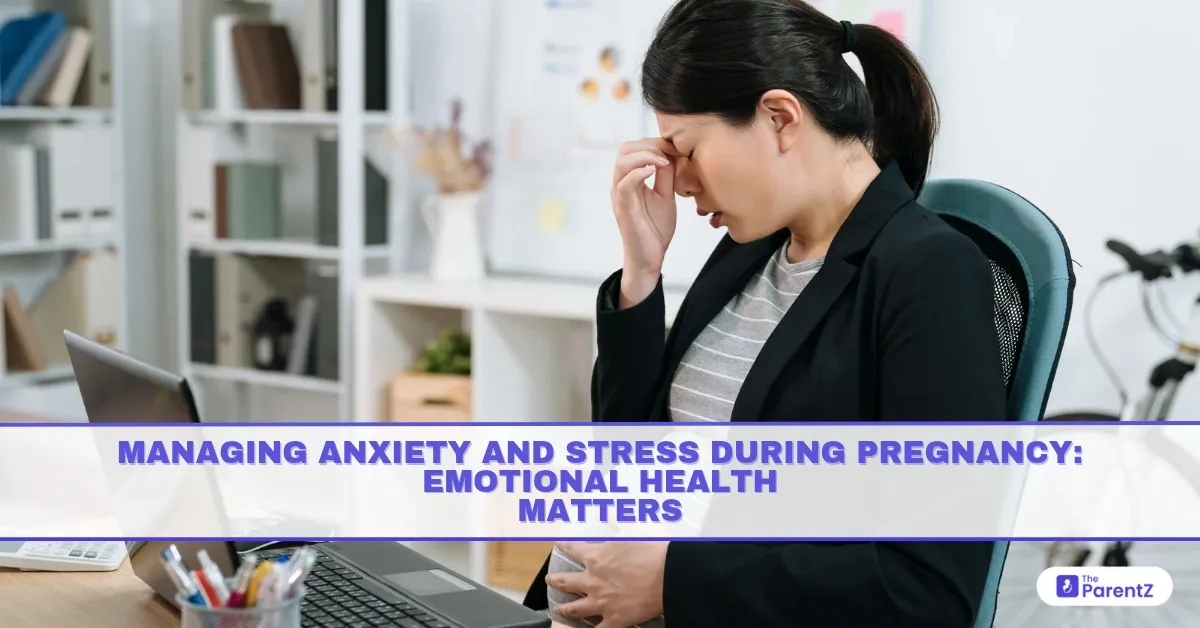Pregnancy is a life-changing journey filled with excitement, anticipation, and sometimes, overwhelming stress. While some level of worry is normal, excessive anxiety can affect both the mother and baby.
From hormonal changes to concerns about labor, finances, and parenting, expectant mothers face multiple emotional challenges. That’s why managing stress during pregnancy is essential for overall well-being.
Why Do Pregnant Women Experience Anxiety and Stress?
1. Hormonal Changes and Emotional Sensitivity
Pregnancy triggers hormonal fluctuations that can heighten emotions and stress responses.
• Increased progesterone and estrogen can cause mood swings.
• The body produces more cortisol (stress hormone), making pregnant women more prone to anxiety.
• Sleep disturbances due to hormonal shifts can further impact mental health.
2. Fear of the Unknown and Labor Anxiety
Many expectant mothers worry about:
• Pain and complications during delivery
• Baby’s health and development
• Postpartum recovery and new responsibilities
Uncertainty about the birthing process can lead to heightened anxiety, especially for first-time moms.
3. Pregnancy often brings financial concerns
• Medical expenses (prenatal care, delivery costs)
• Parental leave and job security
• Managing expenses with a growing family
Balancing work responsibilities with pregnancy can also be challenging, leading to stress and exhaustion.
4. Relationship and Social Stress
• Lack of emotional support from a partner or family
• Changes in relationship dynamics due to pregnancy
• Social pressure and unsolicited advice from relatives and friends
Feeling unsupported can increase anxiety and emotional distress.
5. Body Image and Physical Discomfort
As the body changes, some women struggle with body image issues, weight gain, and discomfort. The physical toll of pregnancy morning sickness, back pain, and fatigue, can make daily life more stressful.
Effects of Stress on Pregnancy and Baby’s Health
Chronic stress during pregnancy can have serious consequences:
| Effect on Mother | Effect on Baby |
| High blood pressure (gestational hypertension) | Preterm birth |
| Sleep disturbances | Low birth weight |
| Weakened immune system | Increased risk of developmental delays |
| Risk of postpartum depression | Higher stress levels after birth |
Severe stress may also lead to gestational diabetes, poor eating habits, and reduced oxygen supply to the baby.
Practical Ways to Manage Stress and Anxiety During Pregnancy
1. Practice Mindfulness and Relaxation Techniques
• Deep breathing exercises – Reduces cortisol levels and promotes calmness.
• Prenatal yoga and meditation – Helps center thoughts and relieve tension.
• Progressive muscle relaxation – Eases physical discomfort and stress.
Tip: Try the 4-7-8 breathing technique – Inhale for 4 seconds, hold for 7 seconds, exhale for 8 seconds.
2. Stay Physically Active
Regular exercise can:
• Release endorphins (happy hormones)
• Improve sleep quality
• Reduce physical discomfort and anxiety
Safe pregnancy exercises: Walking, swimming, light stretching, and prenatal yoga.
3. Get Quality Sleep
Lack of sleep worsens stress and mood swings.
• Use pregnancy pillows for better comfort.
• Limit screen time before bed to improve melatonin production.
• Maintain a consistent sleep schedule to regulate body rhythms.
4. Maintain a Balanced Diet
Nutrition plays a vital role in emotional health.
• Omega-3 fatty acids (found in walnuts, flaxseeds) support brain function and mood.
• Magnesium-rich foods (bananas, spinach) help reduce anxiety.
• Avoid excess caffeine and sugar, which can worsen stress.
5. Connect with Loved Ones
Emotional support is crucial for stress relief.
• Talk to your partner, family, or friends about your concerns.
• Join pregnancy support groups to connect with other expecting mothers.
• Don’t hesitate to ask for help with chores or emotional support.
6. Set Boundaries and Reduce External Stress
• Say no to overwhelming tasks and social obligations.
• Minimize exposure to negative news or stressful situations.
• Limit unsolicited advice by politely setting boundaries.
7. Prepare for Birth with Knowledge
• Attend prenatal classes to learn about labor and newborn care.
• Read books or watch educational videos on pregnancy and delivery.
• Have a birth plan in place to reduce uncertainty.
8. Consider Therapy or Counselling
If anxiety becomes overwhelming, seek help from a mental health professional. Cognitive Behavioral Therapy (CBT) is highly effective in reducing pregnancy-related stress.
9. Engage in Hobbies and Self-Care
• Listen to music, paint, or do activities that bring joy.
• Take relaxing baths or get prenatal massages.
• Spend time outdoors and enjoy nature.
Conclusion
Stress and anxiety during pregnancy are natural, but managing them effectively is crucial for your health and your baby’s development. By adopting healthy coping strategies, seeking support, and focusing on self-care, you can enjoy a calmer and more positive pregnancy experience.
Remember, a happy and stress-free mother contributes to a healthy and thriving baby. Take care of yourself—you deserve it!





Be the first one to comment on this story.